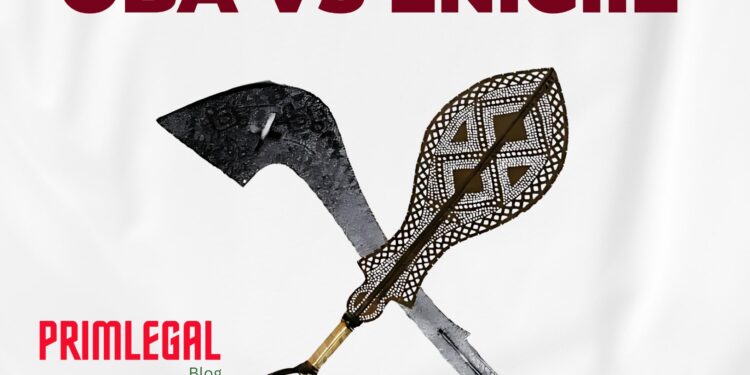The Oba of Benin Kingdom is the spiritual head of the Bini people, the largest tribe in Edo state which occupies 7 (seven) out of 18 (eighteen) Local Government Areas of the state. The stool has been in existence long before colonial times, and had Oba Eweka I as the first Oba in 1180. The reverence and respect the stool commands from its subjects can be said to be second to none. The stool is hereditary, and can only be passed to the first male child of the Monarch.
The Enogie (plural-Enigie) is a duke often appointed by the Oba for specific areas in the Benin Kingdom, to oversee the areas on his behalf. An Enogie is classified as a traditional chief by the laws of Edo state. This stool too is hereditary.
One can say that though there are many Enigie in the Benin Kingdom, there is only one Oba, and from the look of things, the Enigie are subjects of the Oba himself.
This writer is not here to tell you about the dynamic relationship that existed between the Oba of Benin and the Enigie, rather, this writer intends to inform you about a serious crisis that is rocking that relationship, and what the law has to say about it.
It is no news that the present Oba of Benin Kingdom, Oba Ewaure II, has in his wisdom suspended some members of the Enigie, even those that were appointed by the previous monarch. The affected Enigie have decided to take the issue to the judiciary, and want the Court to determine if the Oba has such powers.
Many people see the political tussle in this, others see the action of these Enigies as rebellion and same should be dealt with. Again, this is not why this writer is writing, and the writer would advice this reader to stay away from the dynamics of this relationship and look at the law only.
The big question here is, who has the power to remove/suspend an Enogie?
For one to have power to remove, one must first possess power to appoint. Section 21 of the Traditional Rulers and Chiefs (Amendment Law 1993) of Edo state, (PS: every state in the Federation has its own law as it relates to this issue with similar provisions), states that the Executive Council may appoint in respect of a local government area an authority to exercise the powers conferred by the Law in respect of the office of a traditional chief or an honorary chief. Yes, the executive council is as good as the governor. The appointed authority in respect to section 21 has over the years been the Oba of Benin.
Section 22(2) of the Law says that a traditional chieftaincy title shall be conferred on an individual in accordance with the customary law and is subject to the approval of the “appointed authority” or the Executive Council itself, who may approve the appointment. The key word being “May”. What this means is that, after the Oba of Benin has appointed a person as Enogie, in accordance with the customs and traditions of the Bini people, that appointment needs to be approved by the Executive Council. However, this approval should not be withheld inappropriately.
Technically, it is the Executive Council that has the final say on appointment of an Enogie.
Who then has the power to remove an Enogie should the need arise?
Section 28(1) of the law states that “the Executive Council may withdraw the approval of the appointment of, or suspend or depose, any traditional ruler, regent, traditional chief or an honorary chief whether appointed before or after the commencement of this edict, if it is satisfied that such withdrawal, suspension or deposition is required according to customary law or is necessary in the interest of peace or order or good government”
Every word in the above section is key, and if you ask this writer, dangerous. ONLY the “Executive Council” can, or should we use the word “may” “withdraw, suspend or depose” any “TRADITIONAL RULER, REGENT, TRADITIONAL CHIEF, HONORARY CHIEF”. The implication is that, the Oba was not empowered by the law to suspend or removal any of his dukes.
You might want to ask why the “Governor” or “Executive Council” would be given such power. Your guess is as good as mine. I mean, one should think that because these stools existed before the Colonial age, and way before any present government, these prominent stools should have some kind of superiority over the government in the appointment and removal dukes and other traditional chief. Well, the law says otherwise.



In my opinion, a pilot should be able to pick a co-pilot and not one forced on him by the airport authority however, when he wants a change, questions should be asked… It’s not ideal to have a yes-sir council of chief! The king should have incited a temporary suspension and a request for the EC to carry out investigation on the matter…. Buh, what do I know?! not enough law and definitely not enough in Bini tradition.
Wow interesting